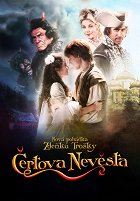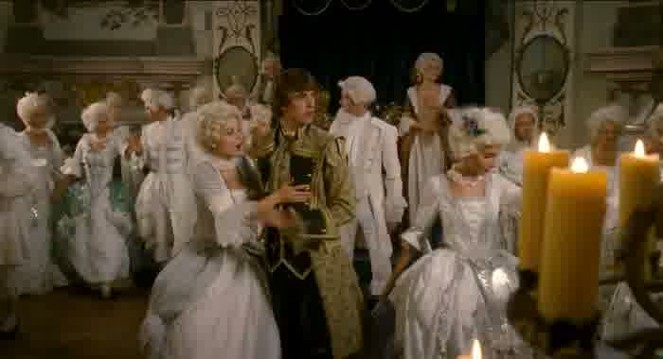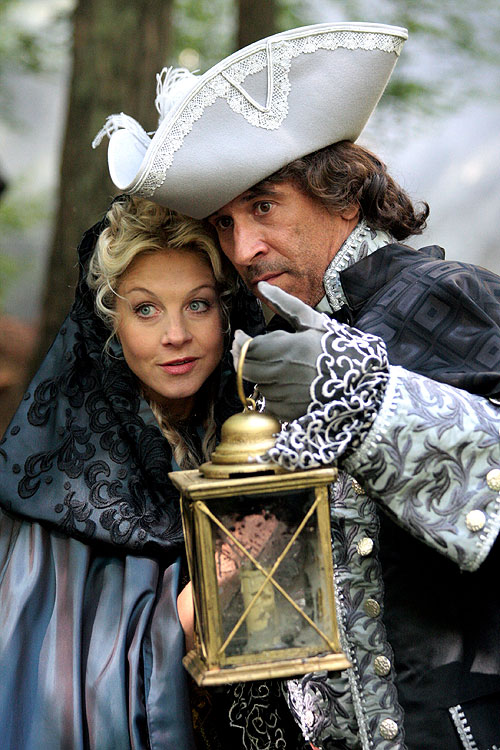Regie:
Zdeněk TroškaKamera:
David PloyharMusik:
Miloš KrkoškaBesetzung:
Václav Šanda, Eva Podzimková, Karel Zima, Sabina Laurinová, David Suchařípa, Jana Andresíková, Bára Munzarová, František Němec, Jan Kuželka (mehr)Inhalte(1)
In a kingdom, where the king's only job is to go hunting, the queen is begging the Saint Kryspina for a baby. When her patience runs out, she asks the devil living in a nearby shabby old mill. And before long, the queen is giving birth to a baby girl. The little princess is growing up with Stepan, the chamber-maid's son, and we see the two fall in love eventually. When it turns out that the queen has a pact with the devil giving the princess to the very Luciper on the day of her 18th birthday, the king throws a ball at which princess Stepanka is about to get engaged with a prince from a foreign country and thus evade her fate. Luciper is one of the suitors, too, but gets rejected by Stepanka. As a revenge, he enchants her into an apparition showing up on the castle's terrace every night. Stepan decides to free her and gets his foot in fighting the hell. His bravery and his great love help him complete three tasks issued by the devil. During the final one, he outsmarts even the Luciper himself and sets his princess free from the hell. And they are in for a wonderful, dreamy life... (Bontonfilm)
(mehr)Videos (1)
Kritiken (4)
Ein Märchen, das mich im Unterschied zum Weihnachtsmärchen Micimutr angenehm überrascht hat. Zdeněk Troška hat diesmal bei mir gepunktet, weil es ihm gelungen ist, in mir wenigstens etwas das Gefühl hervorzurufen, dass ich ein klassisches Märchen sehe. František Němec ist konkurrenzlos, schade, dass er nicht mehr Raum erhalten hat, ebenso wie die Hölle selbst und die Teufel dort.
()
Ein weiteres neues tschechisches Märchen, das schlecht ist. Nach zehn Minuten habe ich nur noch auf František Němec gewartet, der ungefähr eine Stunde später erschienen ist. Seine Schauspielleistung war zweifellos die beste im ganzen Film. Den Rest würde ich gern vergessen. Zdeněk Troška dreht weiterhin Filme, die vor allem ihm interessant vorkommen. Er arbeitet mit Drehbüchern, deren Witze hauptsächlich er witzig findet und die im Großen und Ganzen wahrscheinlich auch nur ihm gefallen. Außerdem hat sich in The Devil's Bride Troškas Bad Joke-Zeit unschön widerspiegelt. Die Dialoge sind manchmal pervers zweideutig und möchtegernwitzig. Die Figuren sprechen überflüssig grob, sie stoßen gegen Bäume, was lustig sein soll, und springen herum. Die Teufel verhalten sich natürlich wie Idioten und haben einen Sprachfehler…Das Einzige, was an diesem Film gut ist, sind František Němec und die Musik.
()
The question is whether it is because Zdeněk Troška was "punished" and had to wait three years longer for his new fairy tale, or if it was something else entirely. Nevertheless, it turned out that The Devil's Bride is one of the best fairy tales that have been produced in the Czech Republic in recent years. Picturesque French rococo, motifs from Božena Němcová, especially from Spravedlivý Bohumil, several pleasant exteriors and interiors of Czech-Moravian castles, experienced actors, and a well-chosen cast. Those are the basic inputs. There is a new use of a range of special effects which do a good job of enhancing the narrative, especially the dialogue with St. Crispin. Fortunately, the fairy tale dialogues and situations are only minimally disturbed by vulgarisms and caricatures in the style of Troška's older fairy tales. That is why it is also possible to forgive the reference to Dorota Máchalová from Bočan's fairy tale Give the Devil His Due. There are no more violent updates beyond that, and overall there is nothing to prevent our enjoyment from adequate performances by the very pleasant Laurinová and Munzar, complemented by the accurate Suchařípa. Karel Zima is here to satisfy those who used to like the devil from The Watermill Princess. His superior, Němec, reigns proficiently, but only for a limited amount of time. Eva Josefíková's performance of Štěpánka completely overshadows Štěpán played by Václav Šanda, who is too similar to Jindřich from The Watermill Princess. The only outright acting fiasco remains the announcer cameo by Alexander Hemala. In general, it can be said that Troška has a happier hand with the fairer sex in his fairy tales (Kubařová's star from the last riddle fairy tale is still rising), and this time his choices were particularly successful - I assume that Štěpánka will take over and Czech film fairy tales will continue at least at this level, which is a pleasant surprise. The awards from Germany and Russia at least suggest this.
()
Fairy tales should have a certain mood, but I have a feeling that I will never be in the mood for this one. Not so much because it was directed by Troška, I've never had anything against him, but mainly because it's quite unoriginal, playing only on the spectacle of costumes, quoting old, better fairy tales, and overall lacking the magic that the first Troška fairy tales had. From "Princess Nastěnka," there is absolutely nothing left, everything is historically kitschy, and even some of the performances are not exactly amazing. Not that there needs to be much acting in fairy tales, but some actors simply weren't well chosen.
()



Werbung